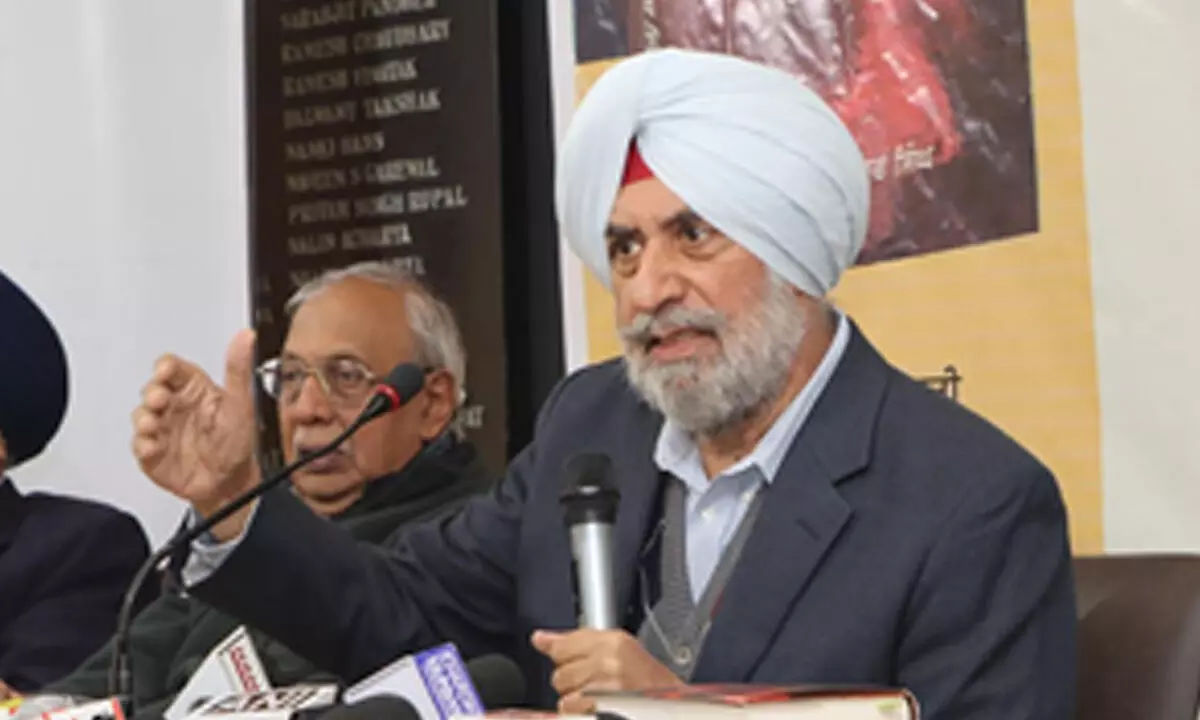Live
- Ahmedabad Plane Crash: Boeing Issues Support Statement Following Air India Flight 171 Crash
- Indian Government Mourns Air India Crash Victims As Rescue Operations Continue
- Air India Plane Crash: All You Need to Know About the Boeing 787-8 Dreamliner
- Pilot gave Mayday call to Ahmedabad ATC before crash
- Boeing shares plunge over 6 pc in pre-market trade after Ahmedabad plane crash
- Air India plane crash: Control rooms set up in Ahmedabad, New Delhi
- Air India Flight 171 Crash: Gautam Adani, Priyanka Gandhi, Rajnath Singh and Others Express Condolences
- Amit Shah Reacts to Air India Flight AI171 Crash in Ahmedabad
- Breaking: Flight AI171 Crashes After Takeoff; Air India Chairman Expresses Deep Sorrow

Punjab's former Chief Secretary, Ramesh Inder Singh's book 'Dukhant Punjab Da', that is an eye-opening account of events before and after ‘Operation Bluestar’, and throws light on the history of Punjab, was released here on Wednesday.
Chandigarh: Punjab's former Chief Secretary, Ramesh Inder Singh's book 'Dukhant Punjab Da', that is an eye-opening account of events before and after ‘Operation Bluestar’, and throws light on the history of Punjab, was released here on Wednesday.
Ramesh Inder Singh was the Deputy Commissioner of Amritsar during Operation Bluestar and he has described the situation as he saw it, in this book.
He was later promoted and retired from the post of Chief Secretary. Ramesh Inder Singh said, “Starting from the year 1978, Punjab went through a volcanic period in which there was endless violence. These few years were to determine the direction of our history. After the country's Independence, perhaps no other domestic crisis would have had such a deep impact.”
“But 40 years after the Bluestar incident, we still hear conflicting stories about what happened and how. This book 'Dukhant Punjab Da' is an eye-witness account of the historical event and those years.
"The book gives a detailed description of the past events which shows the situation of insurgency from its beginning to its end,” he said.
He further said even in the best of times, people's perception of an event or situation varies. Particularly devastating events blur neutrality, divide people, and often ignore the facts.
“Operation Bluestar and the events that followed were disastrous events of this nature, which led India to go to war among itself. The country lost a Prime Minister, a Chief Minister, a former Army Chief, thousands of innocent civilians and some innocent people. However, nearly four decades later, we still hear different stories about what happened, why it happened, and how it happened.
"Facts are eternal, but whose facts are they? It's one person's truth versus another person's, your interpretation versus their interpretation,” Ramesh Inder Singh told the media.
He explains that in June 1984, the Indian Army marched towards Amritsar -- Operation Bluestar was underway. "Some saw it as an attack on the holy site of Sri Harmandir Sahib, while others saw it as a military operation to liberate the holy site from gun-toting terrorists. A few months later, Prime Minister Indira Gandhi was assassinated. Street massacres took place in Delhi and elsewhere, in which more than 3,000 innocent Sikhs were killed. It was genocide while others consider it a spontaneous reaction to the assassination of their beloved leader,” he said.
"For some, Sant Jarnail Singh Bhindranwale was a martyr, as the Jathedar of Sri Akal Takht Sahib publicly stated in 2003. However, others hold him responsible for more than two decades of turmoil, suffering and destruction in Punjab,” he said.
According to Ramesh Inder Singh, he was an eyewitness, and sometimes a role player, although this is inconsequential at this moment in history.
"What I saw or did, or what I failed to do, needs to be told. My conscience, more than anything else, prompts me to state my interpretation of the facts and events during the decade-and-a-half surrounding Operation Bluestar.
"It would not be fair to history to leave things unsaid. Therefore, I feel the need for an objective and factual description of events and incidents. I try to do just that in the pages of this book.
"Terrorism has been decisively eliminated in Punjab. However, the deep, underlying ethno-socio-religious fault lines that have caused turmoil in the state still persist. History has a strange habit of repeating itself and we must be careful, only those civilizations move forward that learn from their history," he said.
"I do not regret the long gap of time in writing this account as the passage of years has helped clarify the issues and cool tempers. Much has been said and written about Operation Bluestar and the turmoil in Punjab in these 29 years.
“Several history books and documentaries and some eyewitness accounts, mostly hearsay, have been published. However, given the sensitivity of the topic and security requirements, not everything has been said and may not be said for some time.
"However, to the best of my knowledge, I have said and written it honestly. I hope, as the frenzy subsides over time, people inside and outside the government will be more receptive to this work," the writer added.
On this occasion, journalist Baljit Balli and the author were engaged in a discussion about the book. Harish Jain, Publisher Unistar Books, was also present on the occasion.

© 2025 Hyderabad Media House Limited/The Hans India. All rights reserved. Powered by hocalwire.com






